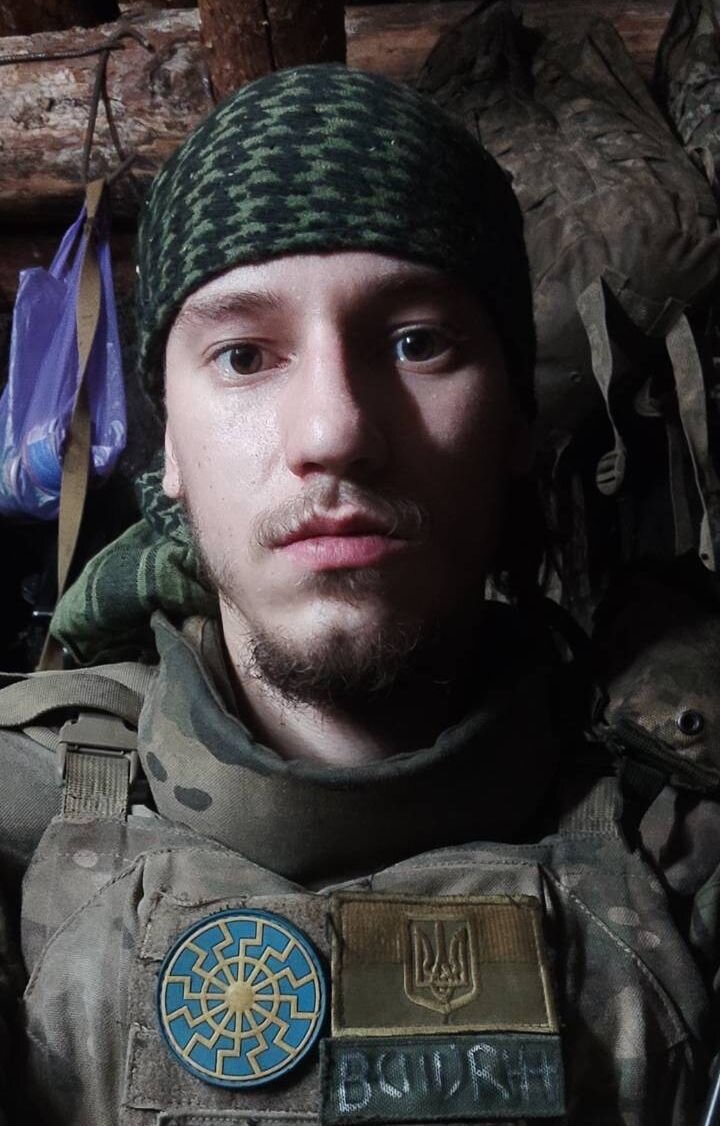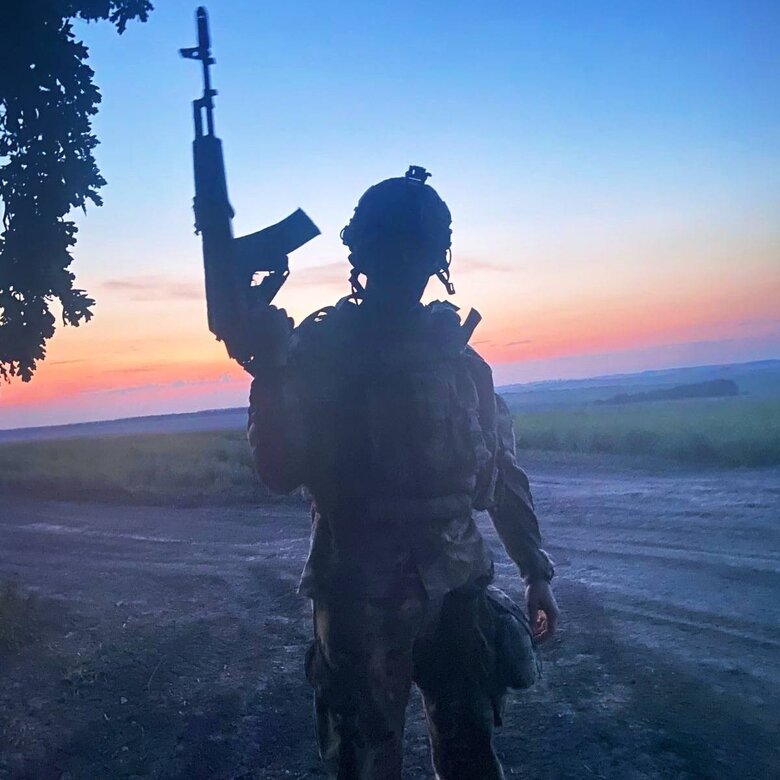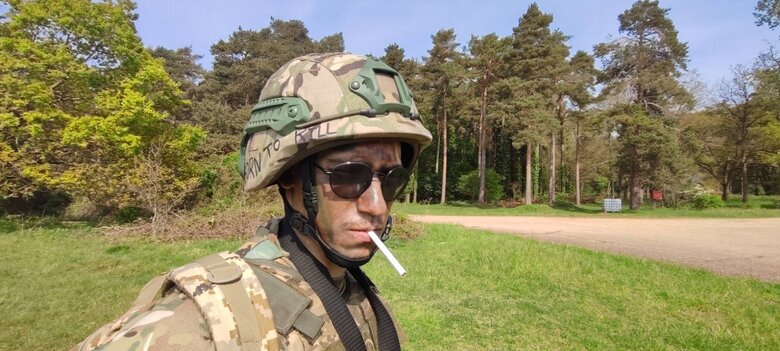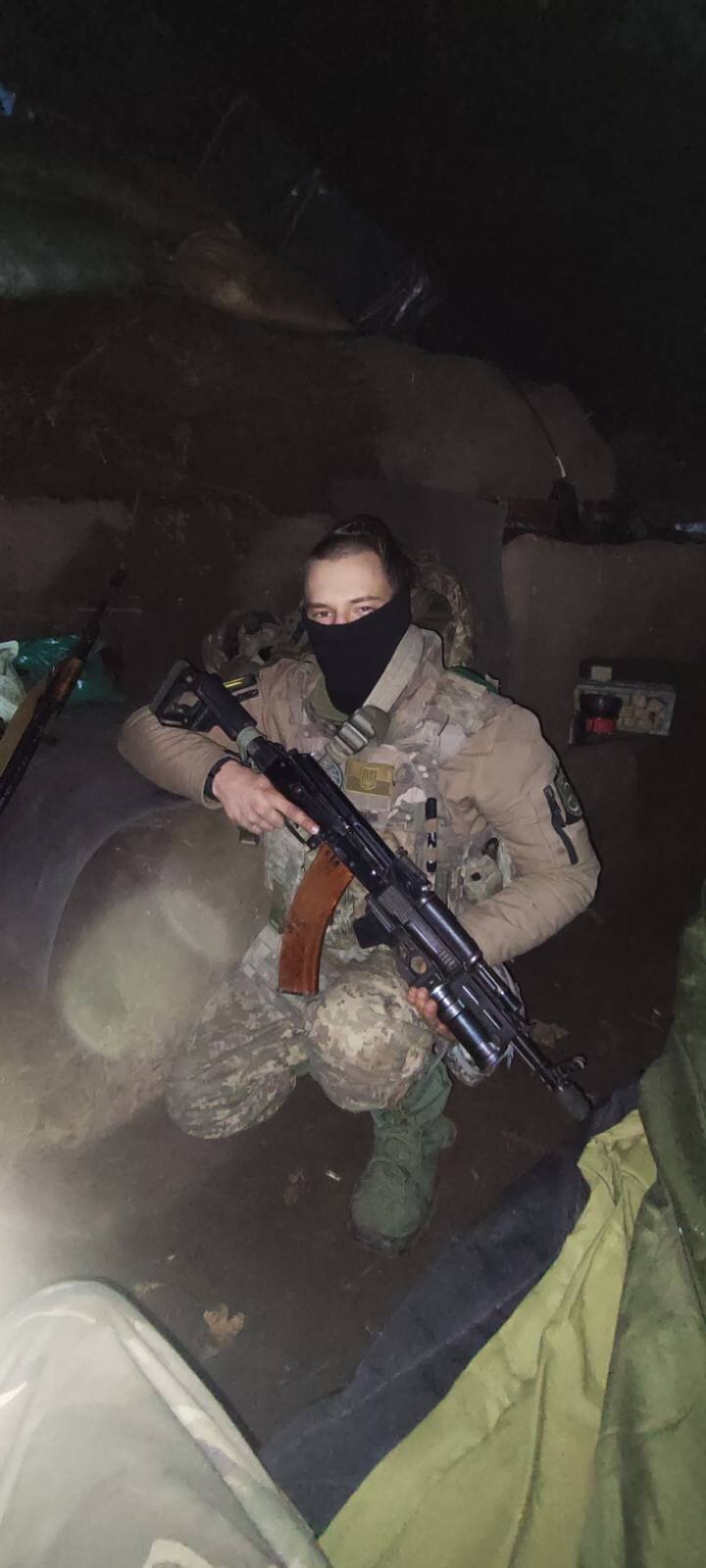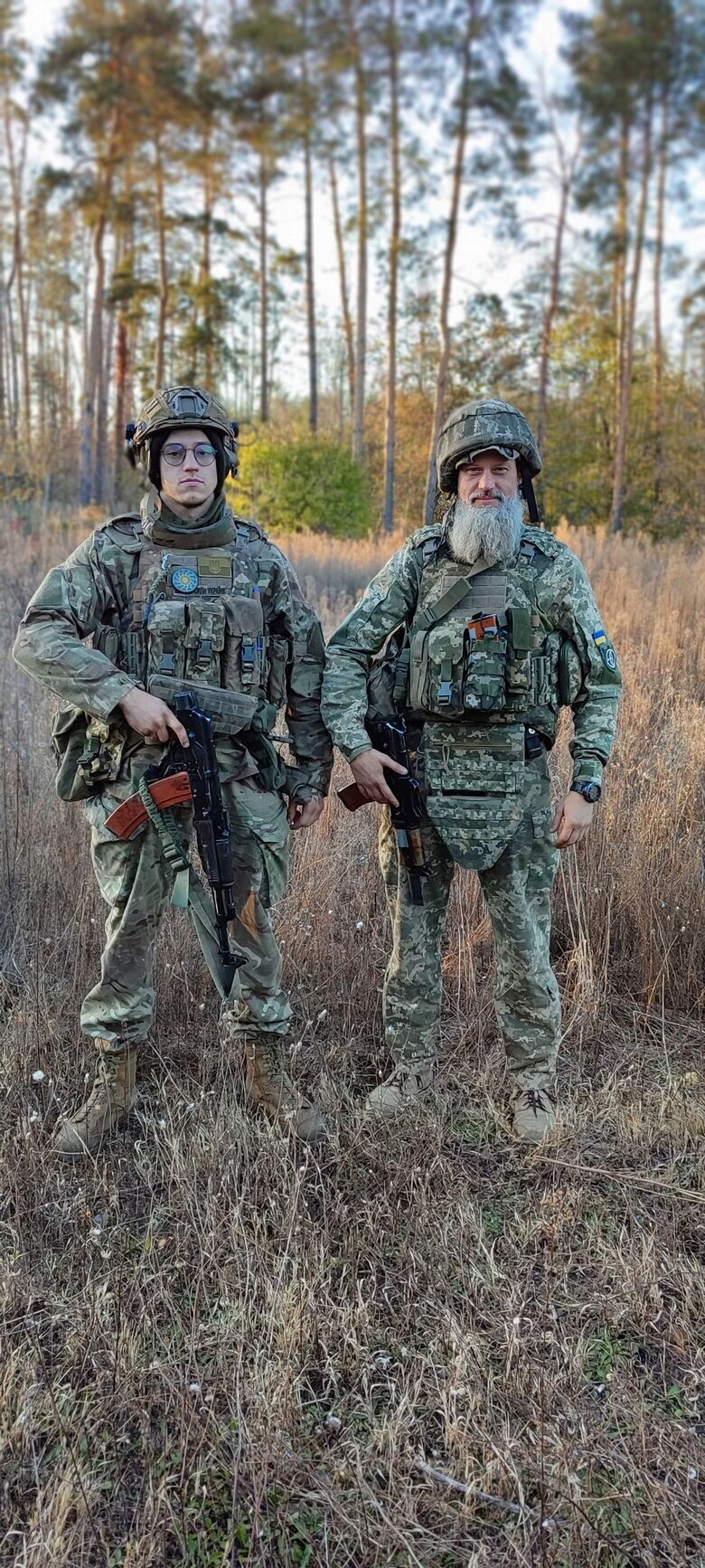Rifleman and UAV pilot Maks Rohachevskyi: "It was said that f***ers were shouting: "Allahu Akbar, for motherland!". But I was shooting from machine gun, from assault rifle, and I didn’t hear their shouts..."
..They came to the military commissariat together: 50-year-old Yevhen Rohachevskyi and his 19-year-old son Maks. They stood in line for a day - yes, back in February 2022, there were lines for the war, and people were ready to give bribes to go fight the occupiers...
Then they fought side by side: Yevhen (VV's longtime guitarist) as a company medic, Maks as a rifleman (later a squad leader) and a UAV pilot.
The elder Rohachevskyi has already told "Censor" about his combat experience in a separate interview. Now it's Maks turn.
- If, at the very beginning of 2022, you, a freshman at the Institute of Culture, were told that in a year's time, you, who had nothing in common with the AFU, would already be fighting against the Muscovites as a junior sergeant, a squad leader, what would you say to such a "prophet"?
- I would not have been surprised at all by such a prophecy. Because even then I was morally ready to meet the enemy. I had a conversation with my father about this. He told me that there would definitely be a war. In a conversation with my friends, I heard other assessments - they told me that it was all newsworthy events, back and forth.
But then they asked: "Maks, but really, if the Katsaps capture Kyiv, what will you do?" I said that I would rather die than have the Katsaps capture Kyiv. So even then I knew I would have to fight.
- You and your father came to the military commissariat together. I'll quote Yevhen Rohachevskyi. "He probably sped me up a little bit, so I would have scratched the back of my head for a couple of days. But it became clear that there was no time. I had to go now. He's young, hot-brained, fast. That's why I had already followed him."
So your dad, as he ironically admits, was following you. And you didn't refuse him?
- No. We were both determined to take up arms and join the army.
- Good. And your mom? Your family? Did they try to prevent you from going to war?
- I did not ask for permission. Of course, they talked us out of it as much as possible. My older sister was panicking - tears and everything. She said: you're not going anywhere. My mom said the same thing. But everyone realized that we had little choice. If the enemy is approaching, something has to be done. They only had a choice to accept it. They are good in this regard: they are holding on strong.
- You both found themselves in the territorial defense forces right away. Tell us how.
- On the 24th, I googled "territorial defense forces". I called the number and asked: I'm 19 years old, will you accept me? They answered: yes, come to this place. The next day, my father and I went there. We stood in line from morning to evening - there was such a large influx of volunteer fighters who were also ready to defend their homeland. We got to the unit only the next day. And only then we received weapons.
- At first, you patrolled the streets of the capital while undergoing training. You had to exchange your flute, drums, and sound engineering things for an assault rifle, and in the middle of a war... Not everyone can do that. How painless was this process for you?
-You know, I'm a man of impulse, and I'm ready for such things, in principle, in life. It's a matter of moral values: can you fight the occupation? If you realize that you can do it, you go and do it. Because it is necessary.
I didn't really know what was going to happen. Nobody knew. But we went, actually, because of moral values.
- Many people are afraid of the unknown factor at the beginning of their military career. No one knows how you will get along in the team, where you will be sent, how you will behave during the first danger. You don't know your capabilities. In 2022, did the shooter Maks Rohachevskyi have such thoughts?
- Of course, they did. It was scary at first. But it never stopped being so. At certain points, when you become more experienced, you get used to it. Then, of course, no one knew what would happen. But we didn't panic because we weren't thrown onto the tanks with assault rifles right away. We simply performed certain combat tasks at checkpoints and at the same time prepared for our first rotation to the East. As for changing the flute and drums for an assault rifle... I think there is nothing incredible about it. Because I have two sisters and a mother, I was motivated. They are more important to me than anything.
-Where did you have to fight in the first year of the war?
- Personally, I had a smooth integration to the zero line - starting from the second line. Later, when the assault on Bohorodychne, Sviatohirsk and Yarova took place, we went right after the soldiers of air assault troops (airborne assault troops - Ye.K.). At that time, there were a lot of "petals" lying there, small anti-personnel mines. My comrade-in-arms, my best friend, lost his leg there. He stepped on a petal and his foot was amputated above the heel by 17 centimeters. But he got prosthetics and has already returned to our unit to serve. This is a man I respect very much.
- So let's call his name him because he deserves it.
- Vitalii Kucherenko. I believe he is an example of an unbreakable spirit for our society. He got his first combat experience back in 2014. By the way, we have enough guys like him in our battalion. But Vitalii is the most illustrative example. He is handsome because he also has a conscience. He went to defend his wife and daughter.
- What do you remember most from the first year of the war? What will you tell your children and friends about?
- The first time we were at the zero line. At that time, we were already more or less experienced in combat conditions. But we had not yet been to the front line, to zero line. And it happened so that we were about to leave for a rotation, but we were turned around and given a new combat order to defend Bilohorivka. I was there for 17 days in a row. And it was my first time going to the zero line on my first rotation.
- Who was on the other side?
- Wagner's fighters. And from our side - we and the 81st Air Assault Brigade. A lot of our guys were killed there... Among them was my comrade Ruslan. We evacuated him together with my father, who was a platoon medic at the time. And then we came back there because we had to keep standing. It was such a withdrawal that I will remember for the rest of my life!
- Tell us more about this story.
- It was like this: snipers from the 81st came and started firing. First from our position, and then from the position to the left, where my father was standing. The snipers were detected by the Katsaps, and they started to fire mortars and shell the position. As a result - two 200ths and two 300ths. When I heard on the walkie-talkie that this was happening at the neighboring position where my father was, I immediately took a stretcher and a first aid kit. My company commander, a lieutenant colonel, was with me at the time. We ran there, and I saw that my father was alive. But a sniper and a fellow soldier from our platoon were killed.
In general, I would like to note that you cannot allow this to happen when a sniper comes and works from your infantry position. The sniper has to work, but definitely not from the position where you are standing.
- Were you surprised when you were appointed a squad commander a year later? Or did you aspire to it?
- Yes, I did. Because my squad commander fled from the position where my father was standing.
- Wow. How did this happen?
- He told me that he was an ATO veteran, but perhaps he was also psychologically got a wild hair up his butt at the time. Of course, you can't do that. How did it happen? He just heard shots at a neighboring position and shouted: "Let's retreat! He took the radio set and ran to our position, to the neighboring position. The company commander, of course, met him with a swear word and shouted: "Stay there and look over there! The radio set was returned to their position. Then he was sent to pick up the charges for the RPG. So he reported on the walkie-talkie that he was shell-shocked, and he went to evacuate...
That's how it happened. But to out my father and my comrades-in-arms under fire, escape from the position like that... You asked if I wanted to become a squad leader? I felt that I had this passion to work then. Besides, my mom is a psychologist, and I have a little bit of a knack for finding common ground with people. So, in general, I saw myself in this role.
- How many people were in your unit when you became commander?
- I had 8 according to the list of staff. We were just recovering.
- The older ones weren't complaining? They said that a young guy, 20 years old, was in charge of us...
- No, there was no such thing in principle. Because if the company commander decided that I would be in this position, then everyone agreed. There were, of course, a few moments, but I generally do not allow them and immediately stop them.
- How does the status of a commander change a person in war? What does he have to change in himself? What should a commander do and what should he not do under any circumstances?
- First and foremost, he must take care of his personnel. How does a position change a person? It adds responsibility. If you are a commander of anything and you have people under your command, you are responsible for their lives. So, for the right people, command functions tend to change for the better. They become more focused. The commander must always communicate with the personnel and with the top management, receive all the information on time and communicate it to the personnel.
- Did you manage to build this communication?
- Yes, I did. It's not a high position - a squad leader. In principle, we have a friendly team in the department, most of us are volunteer fighters. That's why we don't have any serious gaps within the company. In other words, the company commander, platoon commander and squad leader are all in the same boat. Because in combat, we can all go to our positions with confidence. All of us, including the company commander. But I didn't really keep in touch with the higher battalion leadership, because there is a chain of command in the army. So within the company, everything was friendly and well-coordinated.
- I asked your dad a little about your military career. He was sparing with his words. He assumed that you had to tell about yourself if you wanted to. But I have to quote some of his words. "During the previous rotation, he had the experience of close combat and several contusions."
Tell us about your experience of close combat? What do you remember?
-The first contact with fire was like this - I was sleeping in a hole and woke up to shots. I ran out in my socks and started shooting back. I saw only one silhouette and made a couple more shots from an under-barrel grenade launcher. My platoon leader was also in the trench next to me. Together we pushed the enemy back. At the same time, we realized that it was most likely a reconnaissance battle to test us.
It was my first experience of this kind. And then there was another small arms battle, a serious one. I mean, after the first one, I came back in high spirits. But I found out that we had two 200s, and we went to evacuate them. Including the company commander. It was difficult, but we successfully pulled them out to the place where the box arrived, and by the way, with Yevhen, who was already a company medic at the time.
The Rohachevskyis at war: father and son
Then we took revenge for them...
My next battle was at another position, near Dibrova. The day before, a morale officer who was covering the guys in the neighboring position was killed there. He came out of the trench with a machine gun and was killed while covering them. Then my father and I made our way to the positions by daylight. Some of us stayed there, and some of us evacuated the morale officer. I was among those who stayed. And with me, there was a guy who was entering the position for the first time.
- So you were his veteran.
- Yes. And interestingly, he was also 21 years old. I was telling him on the go what to do, where to stand, where to look. He cleaned the machine gun himself, and at one point, in the morning, he went to rest. And he did the right thing then that he wore a load bearing equipment, armor, helmet, assault rifle, and was booted. He was ready, that is.
I woke up from the shots. I had 13 magazines, 7 grenades, and 9 more charges for an under-barrel grenade launcher. And we started shooting back. I ran out of the dugout. I heard my comrade screaming: 300ths! I yelled to him: crawl to the shelter! I saw that he was not seriously wounded - he was shot in the arm. We started fighting. It was a long one - we even had time to smoke, drink water, and unjam our Kalashnikov rifles. Because, in the course of the fight, the Katsaps were ordered to go and go and go - until it got dark. During that time, the guy, who is also 21, he was 300 before the battle started, something hit nearby. As a result, he got shrapnel in his back and shoulder. And when it got dark, I was watching him in the dugout, patching him up a little bit. But he also took cover, and there were six of us left to shoot back. And it felt like a platoon was coming at us.
- Did you know who was coming at you in that battle?
- Most likely, we were stormed by Z-storms, these units. But my comrades told me that they heard the f***ers shouting: "Allahu Akbar, for motherland!". It didn't make any psychological impression on me, because I was shooting from a machine gun, from an assault rifle, and I didn't hear their shouts. I also threw grenades, 10 or more of them. And there was not even a place to draw back my arm.
At that moment, I was really looking into the eyes of death. I realized that they wanted to kill us. Now they will just come close and shoot us. The only way out was to fight and keep shooting back. And that's exactly what we did. I am grateful to God that I survived that day.
- Tell us how and where you got your injuries.
- The first one was in Bilohorivka. A 150-caliber (approximately) hit somewhere near our trench, where there was a kitchen. It hit us 8-10 meters away, so hard that I was calling out to my comrade-in-arms and could not hear myself.
The second one was on my first deployment during the second rotation. It hit near the dugout. I did not understand anything at first. It seemed to deafen me, but not much. But then I burped normally...
And the third, the most serious, was during the battle I have already mentioned. I think it was a shot from either an under-barrel grenade launcher or an RPG at the breastwork next to me. As a result, my helmet was blown off, my hat flew off my head, and I was deafened for about 2 hours. I could hardly hear anything at all in my right ear. I had ringing in my ears. But I immediately put my helmet back on and ran to shoot back. And the hat remained there.
- How do these three contusions affect you over time?
- Sometimes I get ringing in my ears, about once a week. It varies: sometimes it's gone for a long time, and then it comes back again somewhere. It doesn't make me feel stupid, no, knock on wood. But it did affect my aggression a little bit.
- Is there more of it?
- I think so. It's also affecting my memory.

- After completing your rotation, you transferred to the UAV unit. Was it for health reasons or was it absolutely necessary to change your occupation in order not to burn out completely?
- At that time, I was already thinking about this possibility. At the beginning of the war, there were much fewer drones. The war has changed a lot since then.
- Was this new science difficult for you?
- Not at all. I believe that anyone my age can learn to fly in a day. Not with all aspects, but to do reconnaissance, for example, young people can do it easily. I started learning to fly myself when we were in recovery. I had a drone. I turned to the battalion commander and he transferred me to the UAV unit. So, in principle, I did not take any courses. But I had experience in infantry, and then the guys showed me and told me how to work with the equipment. So I quickly got involved in the work.
- Your battalion is fighting in the East. You've already told us about the dangers of your infantry stage. What can you say about the dangers that accompany UAV crews in the combat zone?
- I can speak from my experience here as well. In fact, it all depends on the direction. You need access to the position for the crew to arrive and make replacements. A lot depends on where you are standing. How much safer is it? The working range should be up to 3 km, give or take. Although, of course, you can stand 2 km away or a kilometer away...
- Are you talking about an attack drone or a reconnaissance drone?
- A reconnaissance drone. But also a strike drone. In principle, it's the same. Of course, the closer, the better: you can perform tasks more efficiently. On the other hand, it is more in the range of enemy reconnaissance. It's a matter of finding a balance and building your work on that balance.
- Do you often have to change your place of deployment on an emergency basis?
- To be honest, yes. We were once spotted, and had to move, or rather, take out our equipment. Cables were cut there, and so on... They clearly detected us.
- What did they use to hit you then?
- A mortar. It was a difficult area in general... The key point is not to be spotted. We had to disguise ourselves and do everything very carefully. Listen to see if there is anything else flying around that could detect you. Make sure that nothing is glowing. This moment, I think, is very important in the work. And also the proper arrangement of the shelter. If all this is done correctly, then the work goes well.
- How do you see the dynamics of military operations at the front in terms of UAVs? Back in the spring, it seemed that Russia was ahead of us, at least in terms of the number of UAVs, with different specializations. And now it seems that at least in terms of quality, we are ahead. But maybe you have a different opinion?
- No, I think we are still ahead of the enemy in this matter. Because we started to actively use this feature earlier - also because we did not have enough other weapons. Over time, the enemy also picked up on this theme and caught up with us. And there is already a race going on. But now Ukraine is working on it more actively. Because again, this is a more accessible and convenient resource that we can use. In addition, we have a lot of motivated people who want to do this, and if not fly, then at least produce, collect donations, and so on.
- How do you and your comrades-in-arms assess the Kursk operation? Because I hear different opinions.
- I think it's a great play... although I didn't feel much change on the Eastern Front. The Katsaps are still advancing. But the fact that you can play the game with referendums on foreign territories for two is normal, I think. We have a great, positive attitude to this. It's nice to read such news.
- For 2.5 years we have been hearing the word "victory". What do you consider to be a victory?
- The complete de-occupation of Ukraine. To the 1991 borders. Because otherwise, what's the point? I don't know.
- Have you decided what you will do after the Victory? Or, to put it more carefully, so as not to make God laugh, what would you like to do when this all ends with our victory?
- (Smiles) Ride a motorcycle and...
- ...and not think about anything?
- Actually, I would like to do a lot of things. Self-development. Maybe continue my studies at the university. But now, to be honest, it's very difficult to imagine civilian life. I can't imagine it at all!
Yevhen Kuzmenko, Censor.NET
PHOTO: from the archive of Maks Rohachevskyi

